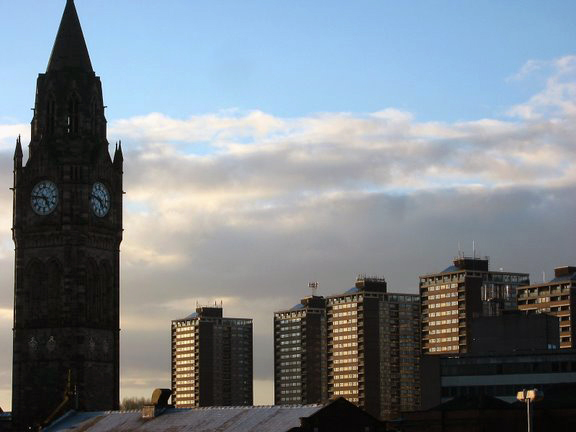Figures show that deprived Rochdale in north west England has more asylum seekers living there than the whole of the south east, which includes wealthy Kent, Oxfordshire, and Berkshire, as local politician calls for the “burden” to be “spread fairly across the country”.
Despite only having a population of 200,000, the figures show the town has 1-in-41 of all asylum seekers in the country, significantly more in per-captia and absolute terms than many other parts, and even regions of the country. With 680 refugees living in the town, it is far ahead of the south-east of England with 441, a little less than the whole south-west, which stretches all the way from Cotswolds market town Chipping Campden to the Isles of Scilly beyond Cornwall.
Rochdale is far from having the most asylum seekers within it’s borders though. Others towns away from the South, include Bolton with 784, Cardiff with 922, and Glasgow with a remarkable 2,562. Overall the north-west had the most asylum seekers of any region, with 6,298 living in the area.
The reason for the distribution of asylum seekers across the United Kingdom that seems to favour the north over the more affluent south is a deliberate government dispersal policy which dates back to the Blair government. The laws, which came into effect almost exactly fifteen years ago, were introduced to tackle the pressure on Dover, London, and the communities around the major airports where the majority of asylum seekers arrived and immediately settled.
A 1999 BBC article explaining the policy said: “Those requiring accommodation will be dispersed to areas with housing to spare, initially likely to be in the north-west and north-east of England”.
Since then the government’s dispersal policy has been to send asylum seekers, for whom the Home Office is legally obliged to pay rent, to areas with low housing costs. Indeed as a recent government document states, “the Department’s policy is not to provide accommodation in London”.
As well as paying local authorities in the north to take large number of asylum seekers, the government also pays large sums to private contractors G4S, Serco and Clearel to provide temporary housing in detention centres at a cost of some £150 million a year.
THe Daily Mail has reported the comments of local MP Simon Danczuk, who spoke out on the imbalance which has seen his constituency town become a magnet for asylum seekers: “I think we can be proud as a country that we offer asylum to people who need it, but we need to make sure the burden is spread fairly across the country. We need to make sure that the system is fair.
“The system at the moment is a shambles and ministers need to explain why David Cameron’s constituency takes no asylum seekers and a wildly disproportionate number are placed in Rochdale.
“This is bad policy and runs the risk of not only putting extra strain on community relations but also putting significant pressure on services that are already struggling due to Government cuts”.
Rochdale, a once prosperous northern market town but better known now as a suburb of Greater Manchester, lies next to the recently contested Heywood and Middleton constituency, where Labour narrowly defended it’s incumbency to UKIP, and maintained the seat by only 600 votes. Local elections in Rochdale earlier this year saw UKIP miss out on council seats there by only 23 votes.
The town is known as being the town where the premiership of former prime minister Gordon Brown came to a crashing end, as he called local woman Gillian Duffy “bigoted” because she dared to speak up on immigration to the area.
Local MP Danczuk has been occasionally mentioned in Westminster circles in past months as a likely convert to Farage’s Euro-sceptic party. Just days after a close electoral shave in Rochdale in May, Danczuk said Labour had to “Stop treating UKIP voters as though they have some kind of unmentionable medical condition”.

COMMENTS
Please let us know if you're having issues with commenting.